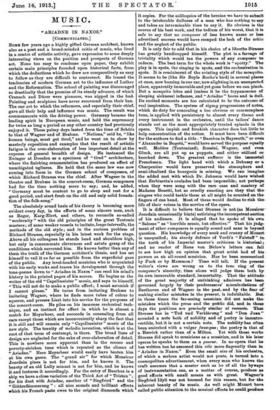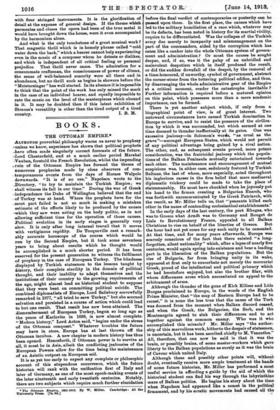MUSIC.
" ARIADNE IN NA XOS." [COMMUNICATED.] SOME few years ago a highly gifted German architect, known also as a poet and a broad-minded critic of music, who lived in a centre of artistic activity, gave expression to some deeply interesting views on the position and prospects of German art. None too easy to condense upon paper, they exhibit certain main principles founded upon historical facts, from which the deductions which he drew are comparatively as easy to follow as they are difficult to controvert. He traced the tendencies of modern German art to the influence of Luther and the Reformation. The school of painting was discouraged so drastically that the promise of its steady advance, of which Cranach and Dfirer were pioneers, was nipped in the bud. Painting and sculpture have never recovered from their ban. The one art to which the reformers, and especially their chief, gave all their help and influence was music. The result was commensurate with the driving power. Germany became the leading spirit in European music, and held the supremacy for twice as long a period as any other country had previously enjoyed it. These palmy days lasted from the time of Schatz to that of Wagner and of Brahms. " Nations," said he, " like human beings, must get tired," and be went on to show by masterly exposition and examples that the result of artistic fatigue is the over-elaboration of less important detail at the expense of general breadth of design. He instanced the Zwinger at Dresden as a specimen of "tired" architecture, where the finicking ornamentation has produced an effect of unmitigated ugliness. He held that the same law was now coming into force in the German school of composers, of which Richard Strauss was the chief. After Wagner• in the theatre and Brahms in the concert-room, German composers had for the time nothing more to say; and, be added, " Germany must be content to go to sleep and rest for a good period, and start fresh on the old and only solid founda- tion of the folk-song."
The absolutely sound basis of his theory is becoming more evident every day, in the efforts of some sincere men, such as Reger, Karg-Elert, and others, to reconcile so-called "modernity" with the old principles of the great Teutonic masters; of some weaker vessels to imitate, longo intervallo, the methods of the old style ; and in the curious problem of Richard Strauss, especially in his latest work for the stage. Above all his colleagues be stands bead and shoulders high, but only in consummate cleverness and astute grasp of the conditions which surround him. He knows better than any of them the truth of the German architect's thesis, and has set himself to veil it as far as possible from the superficial gaze of the public. Any level-headed musician who is acquainted with his early works and traces his development through the tone-poems down to "Ariadne in Naxos " can read his mind's history in the printed pages of his scores. He begins as the writer of the old " Capellmeister " music, and says to himself, " This will not do to make a public effect; I must astonish if I cannot please." He turns from imitating Brahms to imitating Wagner, where be finds more tubes of colour to squeeze, and presses Liszt into his service for the purposes of the concert-room. He piles on his immense orchestral tech- nique, and an instinct for effect in which he is almost a match for Meyerbeer, and succeeds in concealing from all ears except those which are inconveniently sharp the fact that it is still and will remain only " Capellmeister " music of the new style. The tenuity of melodic invention, which is at the root of that term of contempt, is there. The broad lines of design are neglected for the sake of over-elaboration of detail.
This is nowhere more apparent than in the rococo and poverty-stricken tune which is repeated as the climax of "Ariadne." Here Meyerbeer would easily have beaten him at his own game. The "grand air" for which Monsieur. Jourdain pines is not for him, and he knows it. The beauty of an old Lully minuet is not for him, and he knows it and tortures it accordingly. For the entry of Bacchus in a ship we have a close variation of the Third Act of " Tristan "; for his duet with Ariadne, another of " Siegfried" and the " Gotter•dammerung " : all nice sounds and brilliant effects which his French paste owes to the original diamonds which it copies. For the soliloquies of the heroine we have to submit to the intolerable dullness of a man who has nothing to say and takes an interminable time to say it. So obvious is the source of his best work, and the tedium of his worst, that it is safe to say that no composer of less known name or less advertised success would have escaped the lash of the critic and the neglect of the public.
It is only fair to add that in his choice of a libretto Strauss has greatly handicapped himself. The plot is a farrago of triviality which would tax the powers of any composer to redeem. The best term for the whole work is " spotty." The play is in spots, the singing in spots, and the orchestration in spots. It is reminiscent of the aviating style of the mosquito. It seems to be (like Sir Boyle Roche's bird) in several places at once, now buzzing in our ear, now alighting in an unexpected place, apparently immovable and yet gone before we can pinch. But a mosquito bites and (unless it be the trypanosome of sleeping sickness) inflames, and "Ariadne" bores and is dull. Its excited moments are too calculated to be the outcome of real inspiration. The system of zigzag progressions of notes, which do duty for concealing a too obvious or commonplace tune, is applied with persistency to almost every theme and every instrument in the orchestra, until the tailors' dance stands out as the most appropriately treated episode in the opera. This impish and freakish character does but little to help concentration of the action. It must have been difficult for the authors to find a title : "Bacchus in Bayreuth," or even "Alexander in Bogota," would have served the purpose equally well. Moliere (Teutonized), Rossini, Wagner, and even Gluck, are all put up as puppets. and either utilized or knocked down. The greatest sufferer is the immortal Frenchman. The light hand with which a Debussy or a. Charpentier would have preserved the atmosphere and semi-idealized the bourgeois is missing. We can imagine- the added zest with which Dr. Johnson would have wished. that Zerbinetta's roulades had been impossible; not perhaps when they were sung with the rare ease and mastery of Madame Bosetti, but so cruelly exacting are they that the- singers who could tackle them at all might be counted on the fingers of one band. Most of these would decline to risk the life of their voices in the service of the opera.
It is difficult to believe that Strauss is not (as Monsieur • Jourdain occasionally hints) satirizing the incompetent section of his audience. It is alleged that he spoke of his own " Salome " as " horrible music, but effective." That his judg- ment of other composers is equally sound and sane is beyond question. His knowledge of every nook and cranny of Mozart is unequalled ; his sturdy defence of Verdi's " Falstaff " in. the teeth of his Imperial master's criticism is historical; and no reader of Hans von Biilow's letters can fail to see how high an opinion that great artist had of his powers as an all-round musician. Has he been mesmerized by Puck or by Mammon ? Time will tell. If the present writer's views are wrong as to the true ring of the composer's sincerity, time alone will judge them both by its own inexorable standard, immortality. That the attitude of the great majority of unthinking admirers has been governed largely by their predecessors' miscalculations of Beethoven and of Wagner in the past, and by the fear of making similar mistakes in the present, is indubitable. But. in those times the far-seeing musician did not make the- mistakes which the press and the public did, and in these days the positions are precisely similar at roreseio. That Strauss has in "Tod rind Verklarung" and "Don Juan" sounded a note both of nobility and of poetry is incontro- vertible, but it is not a certain note. The nobility has often been smirched with a vulgar faux pas; the poetry is that of a Herrick rather than of a Milton. Yet with these works Strauss did speak to musicians as a musician, and in his later operas be speaks to them as a poseur. In no opera that he has written has he assumed this role more flagrantly than in " Ariadne in Naxos." Even the small size of his orchestra, of which a serious artist would not prate, is turned into a cosmopolitan advertisement, when every man who knows the craft assumes that a master such as he of all the byways of instrumentation can, as a matter of course, produce as good effects with small means as with great. Wagner's Siegfried Idyll was not boomed for this reason, but for the inherent beauty of its music. As well might Mozart have called public attention to the musical effects be could produce with four stringed instruments. It is the glorification of detail at the expense of general design. If the theme which permeates and closes the opera had been of the true metal it would have brought down the house, were it even accompanied by the harmonium alone.
And what is the only touchstone of a great musical work ? That magnetic thrill which is in homely phrase called "cold water down the back," which a hearer cannot help experiencing even in the music of a composer whom be detests or dislikes, and which is independent of all critical feeling or personal prejudice. That thrill never came. The admiration for a consummate craftsman, the consciousness of power of climax, the sense of well-balanced sonority were all there and in abundance, but no thrill such as begins in showers before the " Meistersinger " has well started. In its absence it is impossible to think that the point of the work has only missed the mark in the case of an individual bearer, and equally impossible to rate the music on the level of the masterpieces which abound in it. It may be doubted then if this latest exhibition of Strauss's versatility is other than the tired output of a tired country. I. B. M.















































 Previous page
Previous page